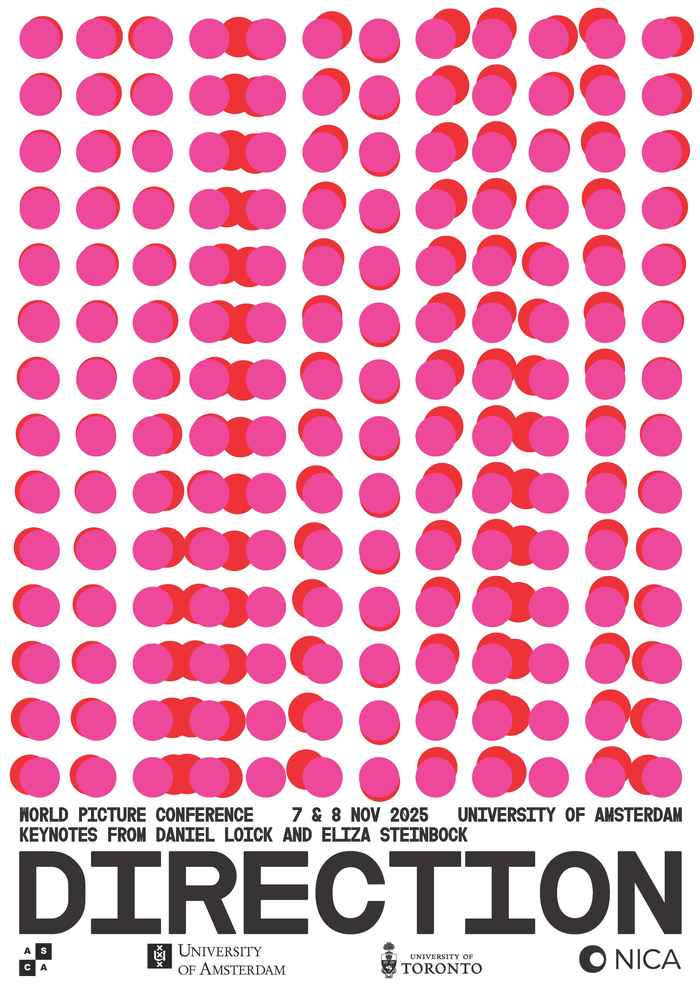2025 World Picture Conference: Direction
- Start date
- 7 November 2025
- End date
- 8 November 2025

Times: See full schedule for details
Registration: Please register here. Note: while the public keynote venues will have a large number of spaces for registrations, the rooms for the regular conference panels have more limited capacity and we expect those registrations to fill quickly.
CONFERENCE DESCRIPTION
The theme of this year’s World Picture conference, “direction,” invites a collection of international scholars to consider what it means to orient ourselves in this moment of global political crisis where borders are being either reinforced or redescribed, when our normal pathways—social, legal, and otherwise—are being disrupted. We are also trying to respond to the imposition of political directives that proliferate crisis and disruption in the name of normality. When one wonders how to act in a moment of political urgency what one seeks is a sense of direction, an effective order. The risk of giving direction is that one takes responsibility for what cannot be guaranteed. Direction can be understood temporally as the structuring of experience through logics of progress, regression and rupture. Direction is also a way of describing a new beginning, as when we decide “to go in a different direction” in some, if not all, aspects of our lives. How do we experience the place we live when we can no longer easily go in one direction or another? How does direction call us to think of migrancy? In a world where there is both too much and too little direction, can we think differently about the value of indirection?
KEYNOTE DESCRIPTIONS
Keynote 1. Daniel Loick (University of Amsterdam)
November 7th, 18:30-19:45 | Universiteitstheater, Nieuwe Doelenstraat 16
Title: Combined and Uneven Fascism
Many contemporary analyses warn us that fascism poses a threat in the future: if we do not act now, democracy is in danger. From the theorists and activists of the Black Radical Tradition, however, we can learn that fascism is not (just) a different political regime, but can (also) be compatible with liberal political institutions: fascism is not a matter of the future, but also of the present and the past. This lecture consults approaches from the ecological postapocalyptic literature in order to ask how the recognition of the differential presence of fascism must change our conception of temporality and directionality—and what this means for political practice.
Speaker bio: Daniel Loick is an Associate Professor of Political and Social Philosophy at the University of Amsterdam. His work sits at the intersection of philosophy, social theory, and politics, within the tradition of critical theory. He is particularly concerned with critiques of state violence and the politics of forms of lif. He is the author of several books, including A Critique of Sovereignty (Rowman & Littlefield, 2018), Juridismus. Konturen einer kritischen Theorie des Rechts (Suhrkamp, 2017), Anarchismus zur Einführung (Junius, 2017), and the newly translated The Abuse of Property (MIT Press, trans. Jacob Blumenfeld, 2025). His essays have appeared in journals such as Constellations, Critical Horizons, Theory & Event, WestEnd, and Philosophy & Social Criticism.
Keynote 2. Eliza Steinbock (Maastricht University)
November 8th, 17:30-18:45 | Oudemanhuispoort (OMHP), D0.08,
Title: Desire Lines towards Death
In Isaac Julien’s militant mourning film, Looking for Langston (1989), frame after frame evokes the thin veil that exists between life and death. Mist, smoke trails, gauzy lighting, and cast shadows all direct our attention to the spirits lingering amongst the living. Responding to the contemporary crisis of white racism, British imperialism, and AIDS deaths, Looking for Langston conjoins the timespace of 1920s Harlem, New York and 1980s Brixton, London. Physical and psychic orientation in time and space is repeatedly confounded by shifts up and down in camera movement. In this talk I consider the persistent thematic of queer and trans artists responding to a moment of political urgency by creating desire lines towards the past and raising the dead. This aesthetic orientation articulates the past historically not to recognize it “the way it really was,” but in Walter Benjamin’s words, “to seize hold of a memory as it flashes up in a moment of danger” (1968, 255). I speculate that a shared horizon of “historical justice” underpins formal devices such as reenactment and dream sequences that seek to rework the directionality of our political present.
Speaker bio: Professor Eliza Steinbock (they/them) holds the Chair in Transgender Studies, Art, and Cultural Activism and directs the research-focused Centre for Gender and Diversity at Maastricht University’s Faculty of Arts and Social Sciences. Eliza investigates the change-making mechanisms operative in the art, culture, media, and heritage sectors. To understand this, they study a range of cultural activism practices that target inequalities by improving the terms of participation and valorizing marginalized knowledges. Eliza is a founding co-editor of the first trans studies book series, ASTERISK: Gender, Trans-, and All That Comes After. They authored Shimmering Images: Trans Cinema, Embodiment, and the Aesthetics of Change (Duke, 2019) and the recent edited volume The Critical Visitor: Changing Heritage Practices (Open Access in English and Dutch, 2023).